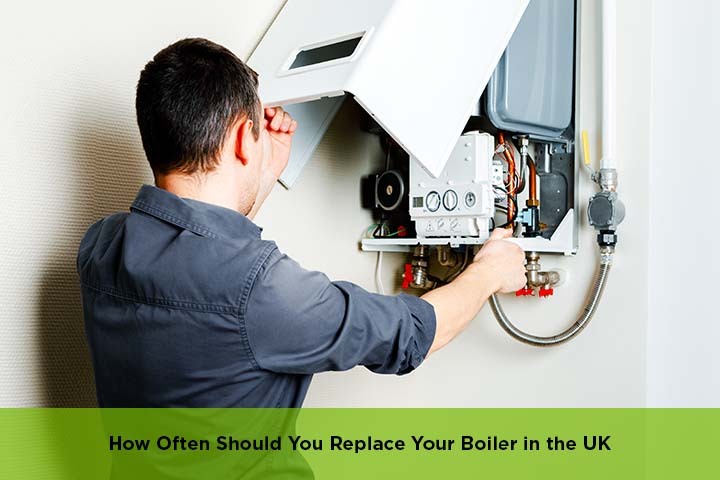Your boiler is working hard every day to heat your house and supply it with warm water. Like any tool, however, it will not be forever. Over time, it loses its efficiency, more frequent malfunctions, and more expensive to use. Because about 60% of your energy bills are used for heat, it is very important to keep your boiler in good shape.
So, how often should you replace your boiler in the UK? If your boiler is more than 10–15 years old, then struggling to heat your home, or needs constant repair, it is time to change it.
How Often Should a Boiler Be Replaced in the UK
Boilers do not live forever. Under normal conditions, a well-maintained boiler will work for about 10 to 15 years. Even if it is in a working position, however, it is not going to work at the same level of boiler efficiency.
The older it is, the more it has to work, which means a high utility bill and a high capacity for breakdown. So, when to replace a boiler? If your boiler is over 10 to 15 years old, it is time to start considering a new one.
Signs Your Boiler Needs Replacing
Here are the most common signs that you need a new boiler:
1. Repeated Breakdowns
If you are calling a gas-safe engineer more than once a year (out of regular servicing), it is a red flag. A repair can cost £ 150 to £ 400 per trip anywhere, and these costs quickly add up.
Instead of spending money on continuous repair, upgrading to a new boiler can save you both money and stress for a long time.
2. Your Boiler Is Very Old
Boilers over 10–15 years of age can still work, but they lose efficiency over time. New models come with better techniques, better reliability, and high energy efficiency, which means they use low fuel to heat your home.
3. Low Efficiency
A-rated boilers are 92% efficient or higher, while old G-rated models can fall below 70%. This means that for every £1 you spend on heating, a G-rated boiler wastes 30p or more. A new boiler will better heat your home and cut your bills.
4. Strange Noises
Boilers usually create a quiet humming sound. But if your boiler starts, clanking or whistling, it may mean that there is a serious internal issue.
Some problems can be fixed with a power flush, but loud or frequent noise can mean that it is time for a replacement.
5. Rising Energy Bills
If your boiler keeps increasing your energy bills despite not changing your use, then your boiler is likely to lose efficiency.
6. Yellow Flame
The flame of your boiler should always be a bright blue. If it turns yellow or orange, it can mean incomplete combustion, and leaking carbon monoxide. This is a serious security risk, so do not ignore it.
7. Water Leaks
A leaking boiler means worn-out parts like valves or seals. Ignoring the leaks can lead to electrical damage, property damage, or even system failure.
Boiler Replacement Cost UK
Boiler replacement and installation in the UK cost between £ 1,500 and £ 4,000. Though the exact cost may vary depending on the type, size, and brand of boilers you will choose. Combi boilers are the cheapest, while the system and traditional boilers can cost more due to additional components.
Here is why many UK homeowners are making the switch:
- Saves the space – a heavy water tank is not required.
- More energy efficient – Combi boilers only heat water when needed, reducing energy waste.
- Low bill – using low energy means inexpensive heating costs.
- Immediately hot water – there is no wait to refill the water tank.
However, combi boilers cannot suit every household. If you have many bathrooms or high water use, a system boiler may be better
Cost to Replace a Combi Boiler
If you are changing an old combi boiler with a new one, the cost is usually £ 1,500 to £ 3,500, including the installation. The price depends on the factors:
- Brand and model of boiler.
- Labor costs (which differ by location).
- Additional work, such as upgrading pipework.
A different swap is usually cheaper and faster than switching on a separate boiler type.
Cost of Oil Boiler Replacement
An oil boiler is more expensive than a gas boiler. The cost of a new oil boiler and installation usually ranges from £ 3,000 to £ 5,500. The price depends on:
- Boiler types (Combi, System, or Regular).
- Labor costs and new pipework requirements.
- Boiler size and efficiency.
Free Boiler Replacement Grants UK
Changing the boiler can be expensive, but if you meet some criteria, you can get a free boiler replacement through the government. The ECO4 scheme is a UK government initiative that helps eligible families to replace old, inefficient boilers for free.
To qualify, you typically need to:
- Own your home or be a private tenant with the landlord’s permission
- Have an old, outdated boiler
- Receive some benefits such as pension credit.
Is Your Boiler Eligible for a Free Replacement?
Your boiler can be eligible if:
- It is more than 15 years old
- It is non-condensing and disabled
- It is beyond repair or expensive to fix
Even if your boiler still works, but is old, you can still qualify for a free replacement. If you are uncertain, contacting an approved ECO4 installer is the best way to check.
How Long Does It Take to Replace a Boiler?
Most replacements take just one to two days. But the exact time depends on this:
- Like-for-like boiler replacement (the same type, the same place) – usually 4 to 6 hours.
- Upgrade to a separate system (eg, switching to a combi boiler) – for about 1 to 2 days.
How Long Should It Take to Replace a Combi Boiler?
If you are changing an old combi boiler with a new one, the process is usually quick and simple. A straight swap usually takes 4 to 8 hours, which means that you have warm water to be hot by the end of the day.
However, if you are switching from a system or regular boiler to a combi, it takes 1 to 2 days for the job. This is because:
- There is a need to remove the old water tank and pipework.
- New pipes may be required to add everything properly.
- Your heating system may require flushing to remove mud or debris.
Tips for Boiler Maintenance
A well-maintained boiler lasts longer, moves efficiently, and saves money on repair. Here is how to keep it in the top shape:
- Get an annual service – A professional check-up helps to catch small issues before big problems.
- Bleed your radiators – if they feel cold at the top, the stuck air can reduce efficiency.
- Check the pressure of the boiler – low pressure can cause heating issues; It should usually be between 1 and 1.5 bar.
- Listen for strange noise – the sound of a bang or whistle ringing may indicate the stuck air or limescale buildup.
- Keep the area around your boiler clear – it requires good ventilation to work safely.
- Turn it on in summer – running it for a few minutes now and then prevents parts from seizing up.
- Insulate your pipes – pipe leggings prevent them from cold in winter.
The Bottom Line
A boiler is not forever, and knowing when to change it, can protect you from unexpected breakdowns, high repair costs, and rising energy bills.
Most boilers run for 10 to 15 years, but if yours is old, noisy, leaky, or running your bill, it is time to consider a replacement.
If your boiler is on your last leg, do not wait for a breakdown – move forward and upgrade before the cold months.
Frequently Asked Questions
Most boilers work well for about 10 to 15 years. With regular servicing, some long, but old boilers lose efficiency and cost more to run.
It depends. If your boiler is still running efficiently and does not require many repairs, you may not need to change it yet. But if it keeps on breaking up, it struggles to heat your home, and runs its energy bill then upgrading to a new, A-rated model, can save you money.
Technically, yes, but it is not a great idea. Older boilers are very less efficient and can even cause security risks. Changing an old with a modern model will save you money and make your home safe.







